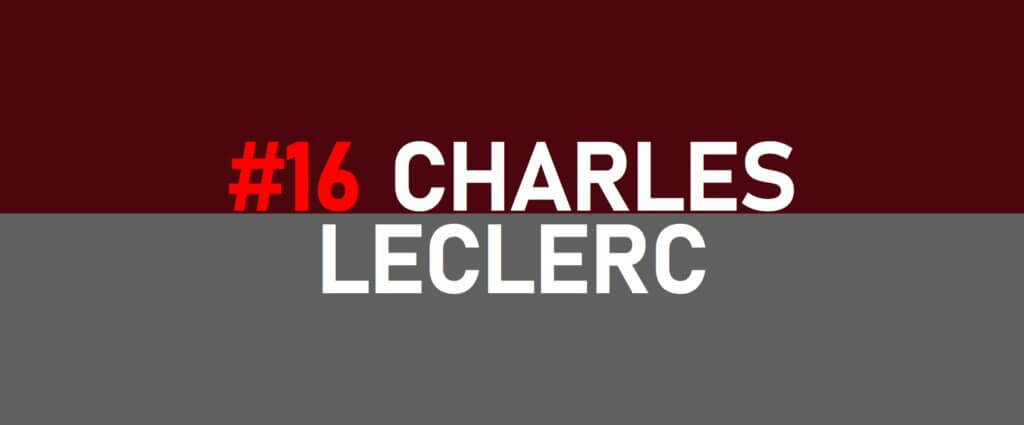Charles Leclerc joined Ferrari after a rookie season to remember in 2018. The 2016 GP3 and 2017 F2 champion has broken records in almost every category he has competed in and became F1’s youngest back-to-back winner in 2019.
| Full Name | Charles Leclerc |
| Nationality | Monegasque |
| Date of Birth | 16th October 1997 |
| First Race | 2018 Australian Grand Prix |
| First Win | 2019 Belgian Grand Prix |
| Wins | 5 |
| Poles | 23 |
| Podiums | 32 |
| Fastest Laps | 9 |
Charles Leclerc’s first racing experience came when he was just four years old, at a karting track managed by the father of Jules Bianchi. Born and raised in Monaco, Leclerc had a very acute awareness of Formula 1 from a very early age. He began karting in 2005, winning multiple national and international competitions over eight years of competition. Leclerc graduated to single-seaters in 2014 and completed a season in Formula Renault 2.0, where he scored seven podiums and an impressive double win at Monza. In 2015, he moved up the ladder to the Formula 3 series, inheriting pole at his first race and finishing the season fourth in the championship. He also made an appearance at the well respected Macau Grand Prix, where he finished in second, and only half a second behind the winner, Felix Rosenqvist.
Charles stepped up to the F1 support bill in 2016, winning the GP3 title on his maiden attempt and impressively winning his début race in the series. He followed the logical path in 2017 by moving to the Formula Two series with the Prema team. After setting pole on his first F2 appearance, Leclerc well and truly arrived in the series at the Sprint Race in Bahrain. He pitted from the lead on Lap 14 of 23, an unheard of strategy for a Sprint Race, which is usually lights to flag with no stops. Leclerc scythed through the field in the remaining nine laps as though he was playing a video game and the AI difficulty was set to ‘Super Easy’, setting lap times three seconds faster than anyone else on track. Charles did the impossible, clinching the lead of the race on the final lap and taking a well earned first series victory. From there, he went from strength to strength and set the fastest time in Qualifying for an unprecedented eight rounds in a row – doubly impressive and extremely tough to do considering F2 cars are all identical. Despite being excluded from the qualifying session at the Hungaroring for a technical infringement and starting from the back of the grid, he still fought through the field to finish fourth in the Feature Race.
While a disappointing race followed at his home event in Monaco, Charles showed tremendous strength at the next round as, just days after his father died, the Monegasque driver set the pole time by over half a second and would’ve taken a double win, if not for a somewhat unjust time penalty he received in the Sprint race which dropped him to the runner-up spot. Leclerc played an arguably calculated game in the latter stages of his championship bid. but he did enough to maintain a comfortable lead in the championship. He had taken a dominant win in Spa, but was excluded for excessive plank wear hours after the race finished. It was a similarly dominant performance in the Feature Race in Jerez which saw him seal the deal and become the first Formula 2 champion of the modern era.
No rookie had won Formula 1’s main support series since Nico Hulkenberg in 2009, and very few – not even the likes of Lewis Hamilton and Nico Rosberg – have set the records which Charles did in 2017.
Leclerc joined the F1 fold in 2018, driving for Sauber. He became the first Monegasque driver to compete in the sport since Olivier Beretta in 1994. After a trying time in the first few races, Leclerc soon backed up the hype surrounding him with a sixth place finish in the Azerbaijan Grand Prix. He went on to score points in a further nine races, often out-qualifying team-mate Marcus Ericsson by large margins and finishing ahead of the Swede in the races. Ahead of the Singapore Grand Prix, it was announced that Leclerc would be joining Ferrari for 2019, partnering Sebastian Vettel. He’ll become the youngest driver to race for the team since Ricardo Rodriguez in 1961.
Leclerc has the self belief, but lacks outright arrogance. He believes he’s good enough for the top tier of motor racing but, as his past teams have commented, wants to know how to improve even if a weekend runs perfectly. He is entirely focussed on pushing himself and getting better. He regularly worked with psychologists from the Ferrari Driving Academy to better himself on track.
LECLERC IN 2019
After an impressive rookie year, Charles Leclerc stepped up to Ferrari in 2019. Big things were expected from the Monegasque driver, and it didn’t take long for him to show his potential. It was in Bahrain that Leclerc stepped to the forefront, taking his maiden pole position on his second outing with the team. He led much of the race, before a failing engine denied him his first victory. After a string of fifth place finishes, and a disappointing home race weekend, four consecutive podiums followed between the Canadian and British Grands Prix. During that time, he diced for the lead with Max Verstappen in Austria, another race which he led the majority of, but ultimately finished second.
The elusive first win would not come until the start of the second half of the season. In Belgium, Leclerc took his third pole of the season in dominant fashion, with a seven tenths margin over his team-mate. He held off a late race charge by Lewis Hamilton to secure his maiden win, dedicating victory to Anthoine Hubert, who lost his life in the F2 race the day before. While he couldn’t fully celebrate that win due to circumstance, he only had to wait another week before an emphatic victory in Ferrari’s home land, fending off both Mercedes drivers for Ferrari’s first Monza win in almost a decade. While that would be his last win of the year, a further two successive poles followed in Singapore and Russia, seeing him end the year with more pole positions than anyone else.
Team orders and Ferrari go hand in hand, and it was obvious from the first race of the year that this would be a talking point in Leclerc’s season. In the first three races, he was instructed to stay behind Vettel in Australia, instructed to do the same in Bahrain (which he defied) and instructed to let him past in China. Team orders and strategy would cause controversy again later in the season in Singapore and Russia, before Leclerc and Vettel collided in Brazil.
Leclerc finished races in the same place as he started ten times in 2019; more times than any other driver. You could look at this in one of two ways: one, a driver who gets the best out of his car in qualifying and the race, or two, a driver who needs to improve his racecraft to move up the field on Sundays. Whichever way you look at it, 2019 was a solid first year at the Scuderia for Charles Leclerc. Read more: Charles Leclerc’s 2019 F1 Season In Stats.
LECLERC IN 2020
In his second season at Ferrari, Charles Leclerc had the upper hand on team-mate Sebastian Vettel. Their qualifying battle ended 13-4 in Leclerc’s favour, and the Monegasque driver was the faster of the Ferrari pair in all but eleven of the 51 track sectors in 2020. In the races, Leclerc scored three quarters of Ferrari’s points.
Ferrari’s SF1000 was not a race winner, but Leclerc found himself in big points-paying positions on a number of occasions. He had six top five results over the season, including two unlikely podiums at the Austrian and British Grands Prix. In qualifying, he was able to qualify fourth on four occasions, while his team-mate qualified in the top five only once this year. 2020 was not the perfect season for Leclerc. Most notably, he collided with his team-mate at the Styrian Grand Prix, brought out the red flags with a heavy crash in the Italian Grand Prix and was eliminated on the first lap in an over-ambitious move at the Sakhir Grand Prix. Read more: Charles Leclerc’s 2020 F1 Season In Stats.
Leclerc has committed to Ferrari for the long term future, with his current deal not ending until 2024. In 2021, as Vettel moves on to Aston Martin, Leclerc will be joined by Carlos Sainz. Will the Spaniard prove more of a challenge to Leclerc than Vettel was in 2020 – and will Ferrari give Leclerc the machinery to battle for wins once more in 2021?
CHARLES LECLERC’S F1 RECORD
| Year | Team | Final Position | Points Scored | Wins | Poles | Podiums |
|---|---|---|---|---|---|---|
| 2018 | Sauber | 13th | 39 | 0 | 0 | 0 |
| 2019 | Ferrari | 4th | 264 | 2 | 7 | 10 |
| 2020 | Ferrari | 8th | 98 | 0 | 0 | 2 |

